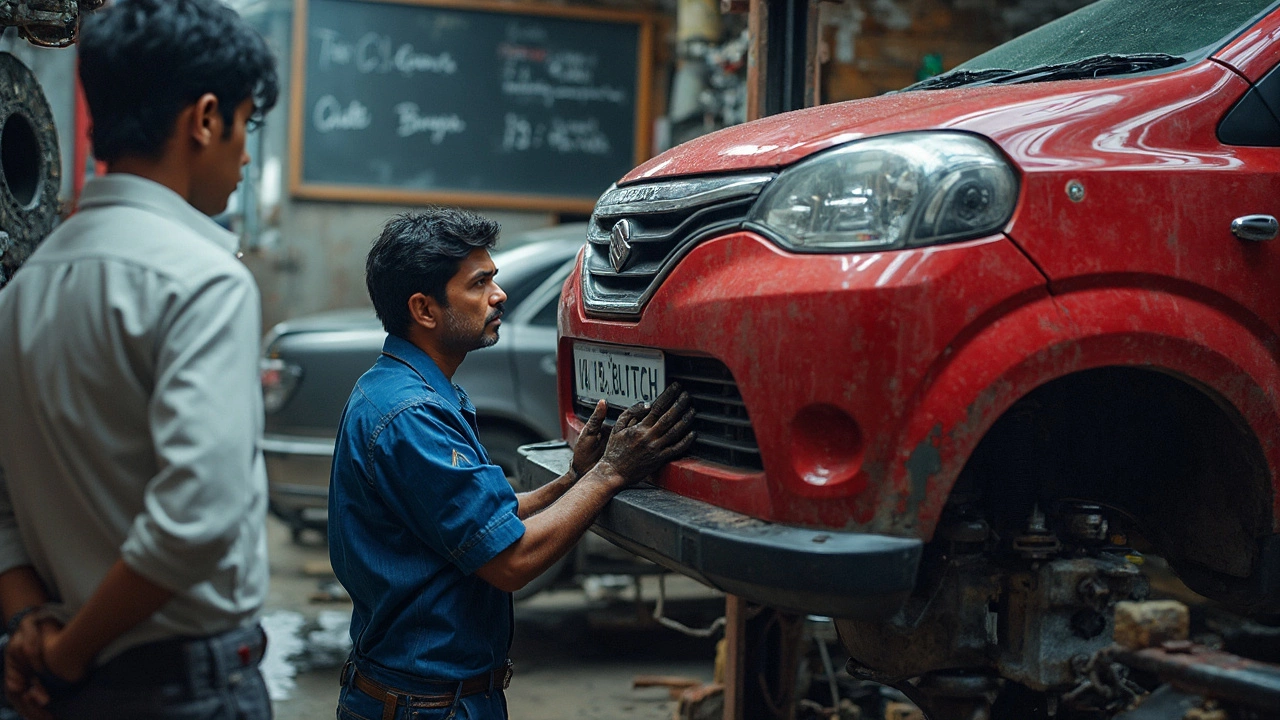 Jun, 13 2025
Jun, 13 2025
Clutch replacement isn’t one of those cheap maintenance jobs you can ignore forever—your car will literally stop moving if you push it too far. Most folks hear ‘clutch repair’ and instantly picture their wallet catching fire. And yeah, it’s not pocket change, but there’s a reason for that and plenty of ways to avoid paying too much.
The main thing most people want to know: how much, realistically, will I have to spend? The answer depends a lot on what you drive and where you take it. The clutch itself is a big, heavy piece of your car’s guts, buried deep enough that mechanics often spend hours just getting to it. On a small economy car, you might see a bill for $600-$900. If you drive something sportier or a heavy-duty truck, it can jump well past $1,500. European models? Those can hit $2,500 or more, no joke.
- What Affects Clutch Replacement Cost?
- Typical Price Ranges by Car Type
- Can You Save Money on Clutch Replacement?
- When Is Clutch Replacement Worth It?
What Affects Clutch Replacement Cost?
Clutch replacement cost swings a lot depending on a handful of things most people don’t really consider. The biggest chunk of that bill usually comes from labor, not parts. Since the clutch is buried inside the gearbox, mechanics spend three to eight hours tearing stuff apart just to reach it. Some cars are built in a way that almost everything has to come out first—think Mini Coopers or older VW Golfs. That alone can double your labor cost compared to a typical sedan.
It’s not just about the wrench time, though. The type of car matters way more than most expect. Parts for domestic cars, like Fords and Chevys, are usually cheaper and easier to find. European brands—BMW, Audi, Mercedes—tend to use fancier clutches and you’re usually paying a premium for the badge. Trucks and sports cars might use heavy-duty or performance clutches, which also bumps the price.
If you go to an official dealership, you’ll pay top dollar for original parts and branded service. Independent shops and chain garages are often more affordable, but it pays to ask if they use quality parts. There’s also the option to use aftermarket clutch kits—these can save cash but quality does vary.
| Factor | How it Affects Cost |
|---|---|
| Labor hours | 3-8 hours, making up 50-70% of total cost |
| Vehicle make/model | European/imports usually cost more than domestic |
| Parts (OEM vs aftermarket) | OEM is up to 40% pricier than aftermarket |
| Shop type | Dealership higher, independents lower |
| Extra repairs | Worn flywheel, slave cylinder, or hydraulic parts can add $100-$400 more |
Also, don’t forget about mileage. A worn flywheel or leaky slave cylinder often gets spotted mid-job, and those add-on fixes can really pump up your bill. The smart move? Always ask for a full written estimate with potential extras before anyone touches your car. If you want the best deal on clutch replacement, compare a couple of quotes and get the details in writing.
Typical Price Ranges by Car Type
The price for a clutch replacement swings a lot based on the kind of car you drive. Shops usually price these jobs by both labor and parts, and both numbers climb if your car is rare, bigger, or tougher to work on.
If you’ve got a run-of-the-mill sedan—think Honda Civic, Toyota Corolla, or Ford Focus—you’re looking at the lower end. These jobs are pretty standard and parts are everywhere. Pop the hood of a European car like a BMW or Audi, though, and both the parts and labor hours get pricier fast. Trucks, SUVs, and sports cars have heavier-duty parts and setups that can really push up the cost.
Here’s a quick look at what you might actually pay, based on real shop averages as of 2025:
| Car Type | Estimated Cost Range (USD) |
|---|---|
| Compact/Economy Car | $600 – $900 |
| Standard Sedan | $700 – $1,200 |
| Pickup Truck (Light Duty) | $900 – $1,500 |
| Performance Car/Sports Car | $1,200 – $2,000 |
| Luxury or European Model | $1,500 – $2,500+ |
Most folks are surprised to learn that labor can take up over half the total price. For example, a shop might charge $350 for a clutch replacement kit on a Civic, but rack up another $500 or more in labor—it’s not a quick swap like some other car parts. And if the flywheel is bad, which happens a lot on older cars, you’re looking at another $100 to $500 for that part alone.
Heavier vehicles (think V8 Mustangs, 4x4 pickup trucks, or anything German) will always cost more because there’s more to take apart and everything usually weighs a ton. That’s why the same job on a Chevy Silverado might cost double what it does on a Toyota Yaris. Always ask your shop for a breakdown so you know where your money’s going.

Can You Save Money on Clutch Replacement?
If you’re staring at a sky-high clutch replacement estimate, don’t freak out—there are ways to keep the cost down. Some methods require rolling up your sleeves, others just mean asking the right questions at the shop. Here’s what works in the real world:
- Clutch replacement prices swing wildly between different shops. Get at least three quotes, even if they’re not local. Some shops charge twice as much for the same job.
- Don’t always go for the dealer. Independent mechanics usually charge 20–40% less on labor and can get aftermarket or OEM-quality parts for less.
- Consider buying your own clutch kit online. Search by your car’s make and model—you might find a solid kit on a trusted site for much less than the shop markup.
- If you’re a DIY type and have the tools (plus a free weekend), you could save hundreds. But this job’s tough: you’ll be working under the car, dropping the transmission. There are plenty of YouTube guides, but if you’re unsure, leave it to the pros.
- If your car’s at the shop for another big fix, ask about a package deal. Some mechanics will drop the labor bill on the clutch if they’re already in there.
- Avoid unnecessary extras. Some shops tack on things like flywheel resurfacing even if it’s not needed. Ask for pictures or the old parts if they claim it’s urgent.
Here’s a quick breakdown of possible savings you could find, depending on where and how you shop around:
| Option | Estimated Savings (%) | How To Do It |
|---|---|---|
| Independent Shop vs Dealer | 20–40% | Call 2–3 local shops, get written estimates |
| Supplying Your Own Parts | 10–30% | Buy a clutch kit from a trusted online retailer |
| DIY Approach | Up to 60% | Have tools & space, follow a quality DIY guide |
| Bundling Repairs | 5–15% | Combine clutch job with other big repairs |
No matter what, don’t be afraid to ask for details on labor and parts, or to push back if something on your bill looks sketchy. The more you know and plan ahead, the less likely you are to fork over extra cash for stuff you don’t need.
When Is Clutch Replacement Worth It?
So, is it actually worth shelling out for a clutch replacement? Here’s the bottom line: if you notice the gears slipping, a burning smell, or the pedal feels odd, you can’t really dodge this repair. A busted clutch can leave you stranded. But it’s not always a black-and-white decision—sometimes it makes sense to hold off, other times you need to act fast.
First, think about your car’s age and value. If your ride’s barely worth a grand and the clutch replacement will cost nearly the same, it might be smarter to sell or scrap. But if you’ve got a newer, reliable car and the clutch is the only thing holding it back, replacing it can give you several more years of driving. According to AAA, the average cost of a new car in the US is over $45,000 in 2024, so investing even two grand in a solid used car is still way cheaper than a new ride.
- Your car isn’t shifting smooth anymore: Grinding, shaking, or sticking pedals mean it’s time.
- You drive a manual for work or daily commutes: Stalling in traffic isn’t just annoying—it’s dangerous.
- You plan to keep the car for at least a year: The replacement pays off over time, not if you’re ditching it next month.
If you’re not sure, get an honest quote from a mechanic and compare it with your car’s resale value. If the repair costs are more than half your car’s value, weigh your options hard.
| Situation | Recommendation |
|---|---|
| Clutch repair costs less than 30% of car value | Usually worth it |
| Repair costs 30-50% of car value | Think twice, but may still make sense if car is reliable |
| Repair costs over 50% of car value | Consider replacing the car |
Timing matters too. Don’t wait until the clutch fails completely—towing adds another $100 to $200, and the inconvenience isn’t worth it. If you’ve already paid for other expensive fixes this year (like engine or transmission work), add those up before deciding to pour more money in.